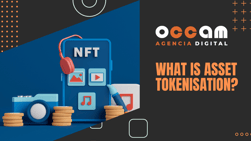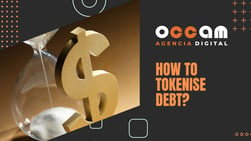Index Content
By now, if you have even the slightest idea of what blockchain technology is, you will have heard of the token economy (tokenomics). A token is a unit that has value in a certain context. For example: technically, a pack of cards is just a piece of cardboard, but in the context of brisca, a card can represent the ace of trump.
If we translate this idea to the tokenisation of companies, a token could very well represent a part of the company. Sometimes companies are uploaded to blockchain-based investment platforms in order to raise funding, and sometimes the company itself is tokenised through the creation of a digital asset that represents it. In this way, it can be divided into many parts.
let's see how it works!
Tokenisation of companies
First of all, from a technical point of view, a token is a digital asset created from a smart contract with a pre-established data structure to guarantee the fulfilment of the contract in a decentralised way.
The first use of the blockchain was to buy and sell cryptocurrencies, but its applications have been expanding year after year. The tokenisation of companies is one of them and consists of creating a digital asset that represents it so that it can be divided into many parts. Bearing in mind that a house cannot be physically divided, the best way to achieve this is to represent it with such a token or asset.
7 advantages of tokenising a company
Below, we have compiled the main advantages of tokenising companies for you to have at hand. Pay attention because they go beyond liquidity:
- The company can be distributed among many people.
- It allows for greater liquidity in the market.
- It facilitates the process of selling the company.
- You do not need to look for buyers on your own thanks to DeFI (Decentralised Finance) markets. They facilitate the creation of liquidity pools of digital assets to access liquidity at any time.
- Liquidity can be raised much faster than with the traditional system.
- Investors are assured that their money will not remain leveraged for years and can reduce their positions or withdraw their entire investment quickly when they need to.
- Investors can solicit investment from hundreds or thousands of people, allowing anyone to access your financial product.
Let's say your company is worth about €100,000. If you want to sell it in the traditional way, you would have to find someone who has that kind of money. If you have a tenth of the tokens that represent it, you can find someone much more quickly, as the cost will be lower.
what types of tokens are there?
Historically, tokens were tokens or vouchers used to replace fiat money. For example: a 5-euro note represents value, but in its most primary sense it is just a piece of paper. The same is true of casino chips.
As you know, cryptocurrencies are the most commonly seen concept in blockchain, but it is not the only application of this technology. The concept of token encompasses much more than that. Here are 3 types of cryptographic tokens:
- Utility tokens are used for a specific application, for example: a cryptocurrency as a means of payment. This type of token is used to support the financing of projects for start-ups or companies. In the world of cryptocurrencies and blockchain technology, we usually associate utility tokens with so-called ICOs and projects under development.
- Security tokens are linked to financial securities and are a type of exchangeable asset, such as traditional company shares. These tokens grant rights and obligations to the owners.
- Equity tokens are backed by a traditional asset, be it a company's shares or real estate. In addition, each token represents a part of the tokenised property. The idea behind this cryptographic token is that companies can issue shares directly on a blockchain, reducing costs and improving liquidity.
Tokens are an integral part of blockchain technology, but there are differences between their modalities. Although utility and security tokens allow access to funding for development, utility tokens are not regulated, while security tokens are regulated by the securities laws of each country. Utility tokens are faster to implement and issue than security tokens and their value is highly speculative. In the case of security tokens, the value is associated with the company's shareholder value ratio and the company's ultimate value.
there are more differences! Utility tokens do not provide participation or voting power within the company or services provided in the company, but security tokens allow the buyer direct participation and voting within the company, unless there are other rights in the contract.
4 common mistakes in tokenisation
In recent years, we have seen all sorts of tokenisations, from NFTs in fashion to debt tokenisation, some very successful, some not so successful. However, the same mistakes are often made:
- "While everything is tokenisable, it doesn't make sense to tokenise every asset.
- "I'm going to tokenise a private project" - tokenisation acquires value when it is made public, so it would make no sense to tokenise a private project.
- "My token looks like a security, but I'm going to launch it as a utility. Ideally, use it as a security and don't try to turn it around just to avoid regulation.
- "The main reason I tokenise is because I need the money" - wrong. Tokenising a company or project does not guarantee getting the money first.
are you familiar with these mistakes? Do you have doubts about tokenising companies? Request a blockchain consultancy with us and solve them.





